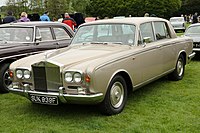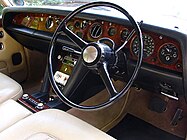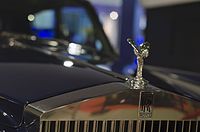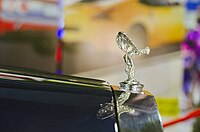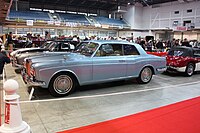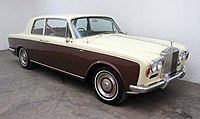Rolls-Royce Silver Shadow
| Rolls-Royce Silver Shadow | |
|---|---|
 1971 Rolls-Royce Silver Shadow | |
| Overview | |
| Manufacturer | Rolls-Royce Ltd (1965–1973) Rolls-Royce Motors (1973–1980) |
| Also called | Rolls-Royce Silver Wraith II |
| Production | 1965–1980 30,057 produced |
| Assembly | Crewe, England |
| Body and chassis | |
| Body style |
|
| Layout | Front-engine, rear-wheel-drive |
| Related | Bentley T-series Rolls-Royce Camargue Rolls-Royce Corniche |
| Powertrain | |
| Engine | |
| Transmission | 4-speed automatic (1965–70; RHD only) 3-speed THM 400 automatic |
| Dimensions | |
| Wheelbase | 119.5 in (3,035 mm)[2] 123.5 in (3,137 mm) (LWB) |
| Length | 203.5 in (5,169 mm) 207.5 in (5,270 mm) (LWB) |
| Width | 71 in (1,803 mm) |
| Height | 59.75 in (1,518 mm) |
| Kerb weight | 4,648 lb (2,108 kg) |
| Chronology | |
| Predecessor | Rolls-Royce Silver Cloud III |
| Successor | Rolls-Royce Silver Spirit |
The Rolls-Royce Silver Shadow is a full-size luxury car produced by British automaker Rolls-Royce in various forms from 1965 to 1980. It was the first of the marque to use unitary body and chassis construction.
The Silver Shadow was produced from 1965 to 1976, and the Silver Shadow II from 1977 to 1980. The combined model run was 30,057 cars manufactured; James May reported it in 2014 as the largest production volume of any Rolls-Royce model.[3]
A Bentley-badged version, the T-series, was produced from 1965 through 1980 in 2,336 examples.
Models
[edit]Silver Shadow
[edit]The Silver Shadow was originally intended to be called Rolls-Royce Silver Mist, but was replaced with Silver Shadow at the last minute due to Mist meaning "manure" or "crap" in German.[4] It was designed with several modernisations in response to concerns that the company was falling behind in automotive innovation, most notably in its unitary construction.
Style-wise, the John Polwhele Blatchley design was a major departure from its predecessor, the Silver Cloud. More than 50% of Silver Clouds had been sold on the domestic market where, by the standards of much of Europe and most of North America, roads were narrow and crowded.[5] The new Shadow was 3+1⁄2 inches (8.9 cm) narrower and 7 inches (18 cm) shorter than the Silver Cloud, but nevertheless managed to offer increased passenger and luggage space, thanks to more efficient space utilisation made possible by unitary construction[5] and a full-width, slab-sided body design.
Other new features included disc brakes replacing drums, and independent rear suspension instead of the outdated live rear axle design of previous Rolls-Royce models.
The standard wheelbase Silver Shadow measured 203.5 inches (5,170 mm), 4,700 lb (2,100 kg) and had a book price of £6,557[6] in the first year of production.
The Shadow featured a 172 hp (128 kW) 6.2 L V8 from 1965 to 1969, and a 189 hp (141 kW) 6.75 L V8 from 1970 to 1980. No official power outputs were stated, but registration authorities in many markets required outputs be listed. Left-hand-drive models were coupled to the recently introduced Turbo-Hydramatic 400 automatic gearbox sourced from General Motors (GM). Pre-1970, right-hand-drive (RHD) models used a highly modified, aluminum-cased version of the original cast-iron 4-speed Hydra-Matic gearbox that had been built in Crewe under licence from GM since 1953. From 1968, export RHD cars gained the Turbo-Hydramatic 400, and by 1970, the 4-speed unit had been completely phased out even in the home market.[7]
A distinctive feature was a high-pressure hydropneumatic suspension system licensed from Citroën, with dual-circuit braking and hydraulic self-levelling suspension. At first, both the front and rear of the car were controlled by the levelling system; the front levelling was deleted in 1969 as it had been determined that the rear levelling did almost all the work.[8] Rolls-Royce achieved a high degree of ride quality with this arrangement.
-
1968 Rolls-Royce Silver Shadow
-
1972 Silver Shadow interior
-
Front grille (top) of a 1972 Silver Shadow, showing Rolls-Royce's trademark bonnet mascot, and the double R logo below it
-
Side profile close-up of the "Spirit of Ecstasy" / "Flying Lady" mascot of a 1972 Silver Shadow
Two-door versions
[edit]A two-door saloon was introduced early in 1966, followed by a convertible in 1967.[1] There are two different versions of the two-door saloon – the more common Mulliner Park Ward, featuring a raked C-pillar and swooping rear bumper line, and the very rare early James Young model reflecting the more formal 4-door that was only built in thirty-five Rolls-Royce examples (with another fifteen Bentleys), discontinued in 1967.
The convertible variant, by Mulliner Park Ward and similar in style to its 2-door saloon, was marketed as the Silver Shadow Drophead Coupé.[9]
-
1967 Silver Shadow two-door saloon by Mulliner Park Ward
-
1967 Silver Shadow two-door saloon by James Young
-
1967 Silver Shadow Drophead Coupé by Mulliner Park Ward
Silver Shadow II
[edit]

In 1977, the model was renamed the Silver Shadow II in recognition of several major changes, most notably rack and pinion steering; modifications to the front suspension improved handling markedly.
Externally, the bumpers were changed from chrome to alloy and rubber starting with the late 1976 Silver Shadows. These new energy-absorbing bumpers had been used in the United States since 1974, as a response to tightening safety standards there. Nonetheless, the bumpers on cars sold outside of North America were still solidly mounted and protruded 2 in (5 cm) less.[10] Also now made standard across the board was the deletion of the small grilles mounted beneath the headlamps.[citation needed]
In 1979, to commemorate the 75th anniversary of the company, seventy-five Silver Shadow IIs were specially fitted with the original red "RR" badges front and rear, pewter/silver paint, grey leather with red piping, scarlet red carpets, and a silver commemorative placard on the inside of the glove box door. Thirty-three of these were designated for and shipped to the North American market.[citation needed]
Derivatives
[edit]Silver Wraith II
[edit]

Rolls-Royce considered offering a more exclusive, long-wheelbase Phantom VII model based on the Silver Shadow, but production was not pursued and no prototypes were built.[11] Instead, a pilot series of ten stretched-wheelbase "limousines" – which offered an additional 4 inches of rear seat legroom – was built in 1967 and sold, one of them to Princess Margaret.[12]
This long-wheelbase variant was offered in the United States from May 1969, and available to domestic customers from early 1970.[13]
Some extended-wheelbase models were fitted with an electrically retractable privacy glass divider. Outside of North America, the cars with a divider were fitted with a separate air conditioning unit mounted in the boot – North American safety laws made this impossible, as the petrol tank would have had to be relocated. The cars with a divider lost the entire gain in wheelbase, trading off extra legroom for privacy.
Initially, the long-wheelbase model did not have a separate name, but with the introduction of the Silver Shadow II in 1976 the longer car was dubbed the Silver Wraith II.
The Silver Wraith II is identified by all alterations found on the Silver Shadow II and additionally an Everflex-covered roof (also available as an option on the Silver Shadow II), a smaller, more formal rear window, and different wheel covers.
The Rolls-Royce factory built a special stretch limousine on Silver Wraith basis in 1979. It was ordered by the religious leader Bhagwan Shree Rajneesh, who had a collection of 93 Rolls-Royces.[14][15]
Corniche
[edit]In 1971 the Silver Shadow two-door models were given the separate identity of Corniche (with either Rolls-Royce or Bentley badging), and eventually went on to outlive the Silver Shadow by some years with production lasting until 1982 for the coupé and 1996 for the convertible.
Camargue
[edit]Another coupé variant on the Shadow platform was the Camargue, with bodywork designed by the Italian firm Pininfarina, and production running from 1975 to 1986. The Camargue had the distinction of being the most expensive production Rolls-Royce.
Bentley T
[edit]A Bentley version of the Shadow, known as the Bentley T (and Bentley T2 from 1977), was also made. It was mechanically identical and differed only in the badging and design of the radiator shell. The more rounded radiator also required a slightly reshaped bonnet profile. Other modifications were only slight cosmetic ones, a different front bumper and hubcaps. Engine valve covers with a "Bentley" logo were only used when the factory had them available.[citation needed]
The long-wheelbase version of the Bentley T did not have a separate identity and was simply called T long-wheelbase or T2 long-wheelbase. Only a very few of these were built (9 and 10 examples respectively, less than 0.4% of the total long-wheelbase production).
All two-door cars were also available as Bentleys. However, only one example of a Bentley Camargue was ever produced.
Production statistics
[edit]| Model | In production | Units sold/numbers built |
|---|---|---|
| Silver Shadow | 1965–1977 | 16,717 |
| Silver Shadow II | 1977–1980 | 8,425 |
| Total | 25,142[16] |
| Model | In production | Units sold/numbers built |
|---|---|---|
| Silver Shadow LWB | 1969–1977 | 2,780 |
| Silver Wraith II | 1975–1980 | 2,135 |
| Total | 4,915[16] |
Commemoration
[edit]In 2013, the Rolls-Royce Silver Shadow featured on a "British Auto Legends" postage stamp issued by the Royal Mail.[17]
Popular culture
[edit]- The Rolls-Royce Silver Shadow, and its derivatives, have appeared in numerous film and television shows to define the rarefied upper echelons of wealth. The most filmed individual Rolls-Royce motor car, is chassis no. SRH 2971, a shell grey Silver Shadow ( early ). First seen from 1968 in TV series The Avengers then until 1983.
- Rock band Queen frontman Freddie Mercury, who never drove a car because he had no licence, was often chauffeured around London in his Silver Shadow from 1979 until his death in 1991. The car was passed to his sister Kashmira who made it available for display at public events, including the West End premiere of the musical We Will Rock You in 2002, before it was auctioned off at the National Exhibition Centre.[18][19]
- Steve McQueen often drove a 1967 Silver Shadow two-door sedan in his 1968 film, The Thomas Crown Affair.[20][21]
- The Silver Shadow has been used in several James Bond films, including a drophead coupé in On Her Majesty's Secret Service (1969), a Silver Shadow I in The Man with the Golden Gun (1974), a Silver Shadow I LWB in For Your Eyes Only (1981), a Silver Shadow II (driven by Q) in Licence to Kill, and a Silver Shadow II in The World Is Not Enough (1999).[22][23]
- Jamie Farr's Arabian sheikh raced in a 1974 Silver Shadow I in the 1981 action comedy The Cannonball Run.[24]
- One of Princess Margaret's favourite cars was a 1980 Rolls-Royce Silver Wraith II which she owned for 22 years until her death, with notable passengers including Paul Getty, Ronald and Nancy Reagan, Lady Diana Spencer, the Queen and Queen Elizabeth The Queen Mother.[25][26]
- In 1997, a white 1972 Rolls-Royce Silver Shadow was depicted on the cover of the Oasis album Be Here Now. During the photo shoot for the album, the car was lowered into the swimming pool of Stocks House, Hertfordshire.[27]
- A Silver Wraith II (1979 model) made multiple appearances in the first season of Netflix's The Umbrella Academy. It was first very briefly revealed at the end of the series' first episode, "We Only See Each Other at Weddings and Funerals". The same vehicle later made a clearer appearance at the end of "Number Five". It also appeared in the beginning and end of "The Day That Was" and of "I Heard a Rumor". It was seen for the last time at the beginning of "Changes".[28][better source needed]
- Japanese director Juzo Itami was known as an Rolls-Royce aficionado, featuring several Rolls-Royce and Bentley vehicles in his movies including a Silver Shadow in his 1984 film The Funeral, a Bentley T-series in the popular 1985 classic Tampopo, and a Silver Shadow in the 1987 film A Taxing Woman. His last personal vehicle, a Bentley Continental, is maintained at his museum in Matsuyama.[29][30]
- The Corniche immediately became a status symbol for celebrities upon its release in 1971. Paul McCartney, Frank Sinatra and Tom Jones all bought one. David Bowie, Michael Caine, Elton John and Dean Martin put their names on two-year-long waiting lists,[31] and it has been seen in countless films and television shows from Beverly Hills, 90210 to Dynasty, and Dirty Rotten Scoundrels to The Player. No other car conveyed an image of the idle rich better than the Corniche.[32][33][34]
References
[edit]- ^ a b All 33 models, www.rrsilvershadow.com. Retrieved 25 April 2015.
- ^ Cardew, Basil (1966). Daily Express Review of the 1966 Motor Show. London: Beaverbrook Newspapers Ltd.
- ^ James May's Cars of the People TV programme, S1E3, 24 August 2014– "To try and keep up with demand for all these new money buyers springing up all over the place, they over-produced: More Silver Shadows were produced than any other Rolls-Royce."
- ^ "What Forced Rolls-Royce to Rethink The Name "Silver Mist"?". The Sunday Times Driving. 6 June 2014. Retrieved 15 December 2022.
- ^ a b "The doughty dowager comes of age". Car and Driver. 11 nbr 9: 45–47. March 1966.
- ^ "Recommended New Car Prices". Autocar. Vol. 124 (nbr 3656). 11 March 1966. p. 537.
- ^ Severson, Aaron (4 September 2022). "Don't Call It Hydra-Matic: The Rolls-Royce and Bentley Automatic Gearbox". Ate Up With Motor. p. 3. Archived from the original on 6 August 2023.
- ^ "Rolls-Royce Silver Shadow - Hydraulics".
- ^ 1968 Rolls-Royce Silver Shadow Drophead Coupé Brochure Right Hand Drive wv4249, www.ebay.ie As archived at web.archive.org
- ^ Bobbitt, p. 112
- ^ "The Rolls-Royce Photo Archive". Luxurycarphotos.tripod.com. Retrieved 24 October 2009.
- ^ Bobbitt, p. 129
- ^ "More substance for the Shadow: Long wheelbase Rolls-Royce introduced". Motor. No. 3492. 24 May 1969. p. 45.
- ^ Palmer, Susan J. (1988). "Charisma and Abdication: A Study of the Leadership of Bhagwan Shree Rajneesh". Sociological Analysis. 49 (2): 128. doi:10.2307/3711009. JSTOR 3711009. S2CID 67776207., reprinted in Aveling, Harry, ed. (1999). Osho Rajneesh and His Disciples: Some Western Perceptions. Delhi: Motilal Banarsidass. p. 380. ISBN 81-208-1599-8.
- ^ Pellissier, Hank (14 May 2011). "The Bay Citizen: Red Rock Island". The New York Times. Archived from the original on 16 November 2016. Retrieved 10 July 2011.
- ^ a b c d "Rolls-Royce Silver Shadow and Bentley 'T' series". Queensland, Australia: Rolls-Royce Owners Club of Australia, Queensland Branch. Archived from the original on 12 October 2009. Retrieved 25 October 2010.
- ^ "New Royal Mail stamps celebrate classic British cars". The Telegraph. Retrieved 26 September 2022.
- ^ "Flash! Freddie Mercury's Rolls Royce goes for more than SIX times the guide price". London Evening Standard. 14 January 2013. Retrieved 25 June 2022.
- ^ "Freddie's Roller on eBay". London Evening Standard. Retrieved 25 June 2022.
- ^ Jurew, Peter (June 2022). "Movie Cars: 5 Things About The Thomas Crown Affair". Collier AutoMedia.
- ^ "1967 ROLLS-ROYCE SILVER SHADOW TWO-DOOR SEDAN". Bonhams. Retrieved 25 June 2023.
- ^ "On Her Majesty's Secret Service". bestmoviecars.com. Retrieved 25 June 2023.
- ^ "National Motor Museum to mark 50th anniversary of first Bond film". Daily Echo. Retrieved 27 June 2022.
- ^ "The Cannonball Run, Movie Cars (1981)". Motor Car History. Retrieved 25 June 2023.
- ^ "1980 Rolls-Royce Silver Wraith II". H&H Classics. Retrieved 17 December 2022.
- ^ Coman, Monica (13 August 2022). "Princess Margaret's Rolls-Royce Silver Wraith II Is Up for Auction, Third Time's a Charm". Autoevolution.
- ^ Maunder, Rhys (10 December 2021). "Flying Spares X Oasis (Be Here Now)". www.flyingspares.com. Flying Spares. Archived from the original on 15 April 2022. Retrieved 15 April 2022.
- ^ "The Umbella Academy". Netflix. Retrieved 27 June 2022.
- ^ "Tampopo (1985) & A Taxing Woman / Marusa no onna (1987)". Japan On Film. 16 August 2022.
- ^ Kawamata (13 September 2010). "最後の愛車「ベントレー」". Itami Juzo Museum.
- ^ Wells, Jonathan (March 2021). "Celebrating 50 lavish, luxurious years of the Rolls-Royce Corniche". Gentleman's Journal.
- ^ Brennan, Patricia (23 December 1990). "'BEVERLY HILLS, 90210'". The Washington Post.
- ^ Barker, Christian (July 2017). "THE ULTIMATE CARS FOR A RIVIERA JAUNT". The Rake.
- ^ Miller, Daniel (13 December 2011). "The Curiously Ubiquitous Range Rover". The Hollywood Reporter.
- Bobbitt, Malcolm (2004) [1996 (1st ed.)]. Rolls-Royce Silver Shadow, Bentley T-series, Camargue & Corniche (3rd ed.). Dorchester, Dorset, UK: Veloce. ISBN 1-904788-25-4.
Further reading
[edit]- Clarke, R. M.: Rolls-Royce Silver Shadow Ultimate Portfolio, 1999
- Robson, Graham: Rolls-Royce Silver Shadow: The Complete Story, 1998, ISBN 1861261160.

